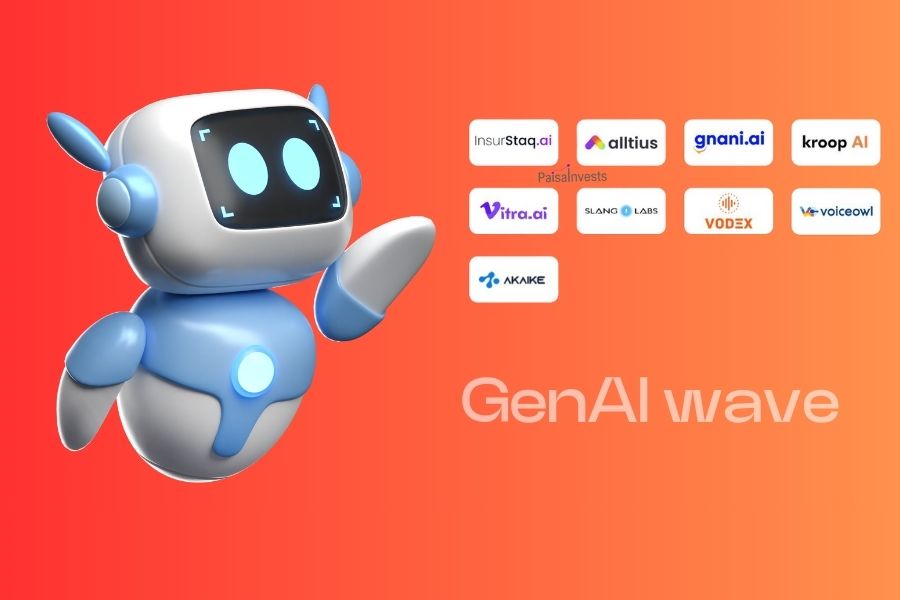ANALYZATION
Modern technologies like GenAI, data analytics, and machine learning (ML) are being used by fintechs to customise financial experiences, upending established models.
Short-term obstacles to GenAI adoption are also anticipated, including delusions, prejudiced judgement, problems associated with data privacy, and government audits.
According to a recent report, a significant number of Indian financial services companies intend to pilot artificial intelligence (AI) within the next year, or have adopted it already.
The unified payments interface (UPI) revolution in digital payments infrastructure has brought about a substantial transition in the Indian fintech industry. Concepts like Buy Now Pay Later (BNPL), neobanking, and digital banking have also been brought about by the digital transition. Now, generative AI (GenAI) is anticipated to be the next major disruption for Indian
Since GenAI lowers costs and improves user experience, it is anticipated that this rise in the finance industry will accelerate.
Speaking with a number of GenAI investors in the nation, Inc42 found that one of the main areas of interest for VCs at the moment is GenAI-based models and applications for particular industries. Most investors anticipate a significant advancement in the application of GenAI in finance and enterprise SaaS.
After speaking with a number of fintech industry players, GenAI startups developing models and applications for the fintech ecosystem, and their investors, Inc42 discovered that, despite potential adoption slowdowns in some areas, a sizable demand has already been generated in areas like the use of AI-based chatbots and voice bots by banks and other financial institutions to streamline customer support procedures.
Furthermore, GenAI is being used more and more to underwrite insurance and to create personalised investment portfolios, loan choices, and insurance policies.
Table of Contents
Are Fintech Startups in India Prepared For GenAI?
According to a recent EY survey, many Indian financial services companies are either planning to trial AI over the next 12 months or have already begun the process of utilising its capability in at least one use case. Right present, the main goals of these businesses in financial services are to deploy GenAI to boost productivity, cut expenses, and enhance customer service.
Fintech appears to be the industry where GenAI adoption is accelerating the fastest, according to Vatsal Kanakiya, CTO at 100X.VC, in an interview with Inc42. This is because financial services involve a lot of manual, repetitive business processes that can be automated. Additionally, he noted that the sector frequently adopts technological advancements among the first in the world.
In fact, he thinks that because the financial and BFSI sectors have so much room for automation, businesses developing GenAI applications ought to focus on them first.
Fintech companies are already upending traditional models by personalising financial experiences with cutting-edge technology like AI, machine learning, and data analytics. The spokesperson continued, “We also think that the growing application of GenAI would significantly contribute to increasing team productivity within businesses and facilitating greater financial inclusion in India.
Given the enormous cost and data input required to establish LLMs from start, financial services businesses currently lean more towards partnerships and outside assistance, but some are also developing their own LLMs internally.
At the moment, GenAI has become well-known in the fintech industry by improving the largest problem: customer assistance.
Automating Fintech Processes with Chatbots Driven by GenAI
Over the past few years, conversational AI has become increasingly popular in a variety of fields. The efficiency of speech and chatbots has significantly increased with the advent of GenAI. Even while this development threatens millions of employment, businesses stand to gain greatly from it.
A representative for PhonePe stated that solutions like AI-powered chatbots are growing in popularity since they function as virtual financial advisors and are always accessible to provide personalized advice.
“By analyzing user data and financial behavior, these conversational interfaces create customized recommendations.The representative stated that there are clear applications of GenAI in fintech, including hyperpersonalised insurance and financial solutions with AI-powered chatbots serving as advisors.
The majority of Indian financial institutions, including big names like HDFC Bank and IDFC First Bank as well as startups like Policybazaar, Plum, and Fibe, are really employing AI-based chatbots to address a variety of bottlenecks.
Cofounder of the online wealth management platform Upstox, Shrini Viswanath, told Inc42 that the business modified its chatbot to use GenAI in October 2023. Customers now receive more relevant content when they ask inquiries since semantic search is more efficient at retrieving documents.
We have observed an increase in both new and active consumers since October, which has resulted in an increase in customer contacts. As we are seeing only 22% of chatbot discussions diverted to a chat agent against 30-35% prior to deploying GenAI, our chatbot is managing this rise in customer contacts more skillfully, according to Viswanath.
Viswanath clarified that, in contrast to shipping or e-commerce platforms, where chatbots’ problems are restricted to refunds or returns, in wealth management, the problems could be as simple as “what should I invest in” or “how to open a Demat account.” Since everything is customized, there is no one-size-fits-all answer. In addition, there are linguistic errors.
“We are leveraging GenAI to give better answers to user queries, which are not wizard-like,” added Viswanath, referring to the OpenAI and Haptik stacks. “In addition, we are using natural language generation to provide customers with an article summary instead of the previous response, which only contained a list of one to three articles.”
Meanwhile, virtual bots have many applications outside of customer assistance, especially in the financial space. Chatbots can be used for a variety of tasks, including fraud detection, account administration, and giving clients personalized financial tips thanks to GenAI models.
Sectors Most Likely to Take the Lead in Adoption of GenAI
Although it’s clear that the adoption of GenAI is still in its infancy, identifying the top fintech subsectors continues to be difficult. Nonetheless, data from different GenAI participants indicates that banks, aggregators, and insurance companies are using the technology more and more. They are using it for things like creating marketing content, evaluating credit risks, underwriting insurance, and enhancing customer service.
Insurance: In an interview with Inc42, Santosh Bhat, head of data science at insurtech startup Policybazaar, stated that the company has been using GenAI to tackle problems for approximately eight months. Although Policybazaar has so far mostly used OpenAI’s models, it is also developing its own internal LLMs to support its platforms.
We are able to comprehend consumer needs, sentiment, and intent thanks to GenAI. Additionally, we can learn whether there has been or might be fraud, according to Bhat.
The CEO and cofounder of InsurStaq.ai, Mayan Kansal, stated that while the insurance market has historically been hesitant to adopt new technology, with the introduction of LLMs, the sector has responded more sensibly.
Professionals in insurance examine vast amounts of data. Whether they are attempting to underwrite something or responding to a request for quotation, they must sort through a large amount of data. Fortunately, LLMs are also adept at analyzing large amounts of data, Kansal added, adding that this is the reason LLMs are gaining traction in this industry.
InsurStaq.ai is developing an insurance-specific search engine by developing end-to-end GenAI infrastructure, including core models.
Payments & Banking: It’s interesting to see that conventional banks haven’t fallen behind. According to reports, HDFC Bank plans to launch a private website powered by LLM in 2024. In order to create business requirement documents and credit assessment models, the bank also intends to use a private LLM.
Additionally, Axis Bank has been attempting to automate its current systems and enhance customer service by utilizing private LLMs.
In addition to insurance, payments, according to Dr. Dinesh Singh, creator and director of FAAD Network, are poised to lead the fintech industry’s adoption of GenAI. Use cases include chatbots for customer service, AI-powered fraud detection, and customized investment advice.
Meanwhile, PhonePe said that it uses machine learning-based predictive logic to predict particular transactions succeeding based on various historical and live performance parameters. Based on this, the payments giant is able to communicate to users the possibility of a transaction failure, while also ensuring that the app will inform them when they can try again.
This has enabled us to provide greater reliability to users and improve success rates,” the PhonePe spokesperson added.
Although lending and wealth management sectors are gradually incorporating GenAI to address diverse challenges, the overall adoption has been relatively slow, except for AI-based customer support processes.
Fraud Detection For The Fintechs: Fintech has traditionally been susceptible to fraudulent activities, but the introduction of GenAI has clearly sparked optimism within the ecosystem that these frauds can be minimised.
Today, GenAI applications have also given rise to deepfakes. In fintech, where a large amount of KYC processes are involved, a person’s voice and also face can be morphed with someone else’s. This is major hurdle GenAI applications building fraud detection capabilities can solve.
Kroop AI, which has built a GenAI-based deepfake detection platform, recently told Inc42 that it is experiencing a surge in inquiries from the banks, globally, for the platform because, most of the time, there is no deepfake detection layer before biometric verifications that pose a significant risk.
In fact, PhonePe also said that efficient use of AI could further improve trust and safety of payment and finance platforms by identifying and preventing frauds, which will, in turn, enable further financial inclusion across the country.
The Challenges To Overcome

While GenAI adoption is expected to transform the fintech ecosystem further, there are also near-term hurdles that can potentially slow the adoption. This includes hallucination, biased decision-making, data-privacy-related risks, as well as high regulatory scrutiny in fintech.
The recent EY report pointed out that leading risk practitioners have highlighted that the use of commercial models may increase the risk of cybersecurity given these external models have access to material and non-public data that financial organisations hold.
While these risks are eminent when using third-party LLMs, financial organisations may encounter comparable regulatory inquiries when using internal models, the report said. It also suggests that even when an LLM is built internally, organisations need to carefully consider the issues related to data lineage and architecture, reliability of model training, accuracy of the outputs, and security checks and balances.
Though challenges remain, industry experts believe that a few years down the line, the inherent issues with GenAI will be largely solved, hence opening a huge scope for its adoption and utilisation in solving the major challenges in fintech.
Disclaimer: The articles on PaisaInvests.com are solely for educational purposes. While we endeavor for accuracy, we make no guarantees regarding completeness or reliability. Readers are advised to conduct their own research and seek professional advice before making any financial decisions. We are not liable for any loss or damage incurred from the use of information provided. Additionally, we do not control the content of external websites linked within our articles.
Visit: https://paisainvests.com/



